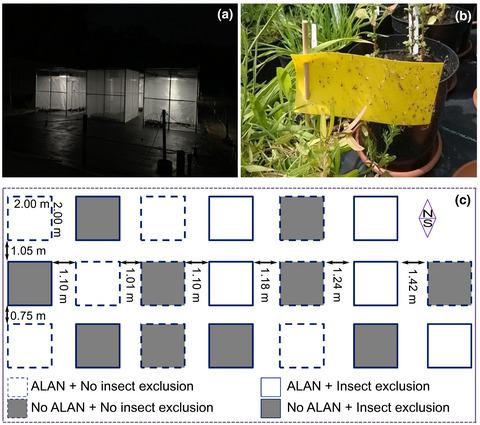当前位置:
X-MOL 学术
›
Glob. Change Biol.
›
论文详情
Our official English website, www.x-mol.net, welcomes your
feedback! (Note: you will need to create a separate account there.)
The Matthew effect: Common species become more common and rare ones become more rare in response to artificial light at night
Global Change Biology ( IF 10.8 ) Pub Date : 2022-02-12 , DOI: 10.1111/gcb.16126 Yanjie Liu 1, 2 , Benedikt Speißer 2 , Eva Knop 3, 4 , Mark van Kleunen 2, 5
Global Change Biology ( IF 10.8 ) Pub Date : 2022-02-12 , DOI: 10.1111/gcb.16126 Yanjie Liu 1, 2 , Benedikt Speißer 2 , Eva Knop 3, 4 , Mark van Kleunen 2, 5
Affiliation

|
Artificial light at night (ALAN) has been and still is rapidly spreading and has become an important component of global change. Although numerous studies have tested its potential biological and ecological impacts on animals, very few studies have tested whether it affects alien and native plants differently. Furthermore, common plant species, and particularly common alien species, are often found to benefit more from additional resources than rare native and rare alien species. Whether this is also the case with regard to increasing light due to ALAN is still unknown. Here, we tested how ALAN affected the performance of common and rare alien and native plant species in Germany directly, and indirectly via flying insects. We grew five common alien, six rare alien, five common native, and four rare native plant species under four combinations of two ALAN (no ALAN vs. ALAN) and two insect-exclusion (no exclusion vs. exclusion) treatments, and compared their biomass production. We found that common plant species, irrespective of their origin, produced significantly more biomass than rare species and that this was particularly true under ALAN. Furthermore, alien species tended to show a slightly stronger positive response to ALAN than native species did (p = .079). Our study shows that common plant species benefited more from ALAN than rare ones. This might lead to competitive exclusion of rare species, which could have cascading impacts on other trophic levels and thus have important community-wide consequences when ALAN becomes more widespread. In addition, the slightly more positive response of alien species indicates that ALAN might increase the risk of alien plant invasions.
中文翻译:

马太效应:在夜间人造光的作用下,常见物种变得更加普遍,稀有物种变得更加稀有
夜间人造光(ALAN)已经并且仍在迅速传播,并已成为全球变化的重要组成部分。尽管许多研究已经测试了它对动物的潜在生物和生态影响,但很少有研究测试它是否会以不同的方式影响外来植物和本地植物。此外,与稀有的本地和稀有外来物种相比,通常发现常见的植物物种,特别是常见的外来物种从额外资源中受益更多。由于 ALAN 而增加的光量是否也是这种情况仍不得而知。在这里,我们测试了 ALAN 如何直接或通过飞虫间接影响德国常见和稀有的外来和本土植物物种的表现。我们种了五个普通的外星人,六个稀有的外星人,五个普通的本地人,和四种稀有原生植物物种在两种 ALAN(无 ALAN 与 ALAN)和两种昆虫排除(无排除与排除)处理的四种组合下,并比较它们的生物量产量。我们发现普通植物物种,无论其来源如何,都比稀有物种产生更多的生物量,在 ALAN 下尤其如此。此外,外来物种对 ALAN 的积极反应往往比本地物种稍强(p = .079)。我们的研究表明,普通植物物种比稀有植物更能从 ALAN 中受益。这可能会导致对稀有物种的竞争排斥,这可能会对其他营养级产生级联影响,因此当 ALAN 变得更广泛时,会对整个社区产生重要的影响。此外,外来物种的稍微积极的反应表明ALAN可能会增加外来植物入侵的风险。
更新日期:2022-02-12
中文翻译:

马太效应:在夜间人造光的作用下,常见物种变得更加普遍,稀有物种变得更加稀有
夜间人造光(ALAN)已经并且仍在迅速传播,并已成为全球变化的重要组成部分。尽管许多研究已经测试了它对动物的潜在生物和生态影响,但很少有研究测试它是否会以不同的方式影响外来植物和本地植物。此外,与稀有的本地和稀有外来物种相比,通常发现常见的植物物种,特别是常见的外来物种从额外资源中受益更多。由于 ALAN 而增加的光量是否也是这种情况仍不得而知。在这里,我们测试了 ALAN 如何直接或通过飞虫间接影响德国常见和稀有的外来和本土植物物种的表现。我们种了五个普通的外星人,六个稀有的外星人,五个普通的本地人,和四种稀有原生植物物种在两种 ALAN(无 ALAN 与 ALAN)和两种昆虫排除(无排除与排除)处理的四种组合下,并比较它们的生物量产量。我们发现普通植物物种,无论其来源如何,都比稀有物种产生更多的生物量,在 ALAN 下尤其如此。此外,外来物种对 ALAN 的积极反应往往比本地物种稍强(p = .079)。我们的研究表明,普通植物物种比稀有植物更能从 ALAN 中受益。这可能会导致对稀有物种的竞争排斥,这可能会对其他营养级产生级联影响,因此当 ALAN 变得更广泛时,会对整个社区产生重要的影响。此外,外来物种的稍微积极的反应表明ALAN可能会增加外来植物入侵的风险。

































 京公网安备 11010802027423号
京公网安备 11010802027423号